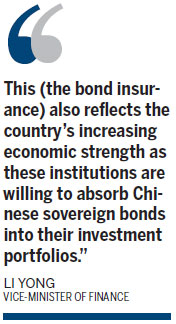

The central government will explore the feasibility of opening up Shenzhen's Qianhai district as the first mainland trial zone for yuan conversion under capital account, said Wang Zhongwei, spokesman of the government's delegation to Hong Kong, on Thursday.

The initiative aims to further promote mutual investment and financial cooperation between Hong Kong and Shenzhen, Wang told media in Hong Kong.
The initiative will cover offshore yuan loans, trade and investment financing, mid-to-long-term bonds development and other financial business, the city's public service broadcaster Radio Television Hong Kong reported, citing government officials.
The National Development and Reform Commission, China's top economic planner, and Qianhai administration bureau was due to hold a news conference to announce specific measures of the initiative.
The current account and capital account are two primary components of a country's balance of payments.
As the latter is not yet fully convertible in China, the trial initiative in the special development zone is also being viewed as testing the water toward further opening up the capital account in the territory.
Nicholas Kwan, regional head of research from Standard Chartered Bank in Hong Kong, said as the Qianhai pilot scheme is a joint effort of several government departments, including the central bank, tax department, commerce department and the customs, the scheme is likely to be carried forward in a prudent manner.
"The Qianhai initiative has been proposed for a while but it has been waiting for specific policies to be decided. Policy implementations in the special development zone will be gradual so as not to lose control," said Kwan.
China has been partially relaxing its capital account regulations through reforming its exchange rate formation mechanism.
Yuan bonds popular
The Ministry of Finance will continue to issue yuan-denominated bonds and enlarge the yuan bond issuance size gradually in Hong Kong to cement the city's offshore yuan financial center status, Vice-Minister of Finance Li Yong said in Hong Kong on Thursday.
Speaking at a ceremony to mark the ministry's fourth batch of yuan bond issuance, Li said that the high-quality Chinese sovereign bonds are becoming increasingly popular among international institutional investors like central banks, endowment and pension funds.
"This also reflects the country's increasing economic strength as these institutions are willing to absorb Chinese sovereign bonds into their investment portfolios," he said.
"In the first five months of 2012, yuan bond issuance registered 40 percent growth compared to a year ago," said Hong Kong Chief Executive Donald Tsang at the Thursday ceremony.
"Since June 2007, (the) yuan bond issuance size in the city amounted to 220 billion yuan, reflecting the local offshore yuan debt market's buoyant development."
In the fourth batch of yuan bond issuance, the Ministry of Finance will issue 23 billion yuan, the highest amount since the first yuan bonds were issued in the city in 2009. The 2012 issuance amount is 15 percent higher than in 2011, and nearly 4 times higher than in 2009.
Of the total 23 billion yuan amount, 15.5 billion will be allocated to institutional investors, 2 billion yuan to other central banks and the remaining 5.5 billion will be allocated to retail investors.
The ministry's statement said that institutional investors had applied for 58.6 billion yuan in total, which represented a 3.79 times over-subscription.
A total of five overseas central banks have applied for 3.06 billion yuan, which is 1.53 times over-subscribed.
The ministry is expected to start the retail investor applications on Friday. Its statement added that the coupon interest of the bond's retail tranches will be 2.38 percent.
Securities cooperation
The central government has unveiled some new policies aimed at boosting cooperation between Hong Kong and the mainland in the securities sector.
Beijing will support eligible financial institutions in Hong Kong to set up joint-venture securities companies, fund management companies as well as futures companies on the mainland, spokesman Wang Zhongwei said on Thursday.
The central government will also encourage cooperation between the two sides in the commodities futures market to take advantage of each other's comparative advantages.
The government will support the listing of qualified mainland companies on the Hong Kong stock exchange, said Wang, adding that it will facilitate fundraising activities of small and medium-sized mainland companies in the overseas markets.
Mainland financial institutions will also be encouraged to set up captive insurance companies (insuring risks of their group or parent company) in Hong Kong to improve the risk management mechanism, added Wang.
To facilitate Hong Kong investment in the mainland capital market, Beijing also plans to lower the threshold for Hong Kong financial institutions to invest in the mainland's stock and bond markets under the qualified foreign institutional investor project.
Contact the writers at [email protected]







